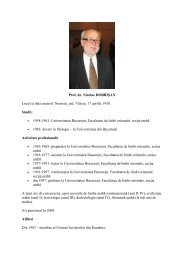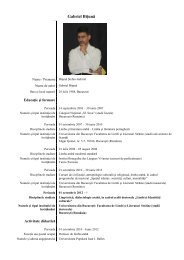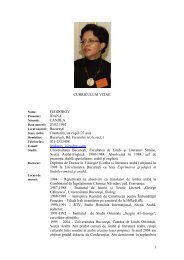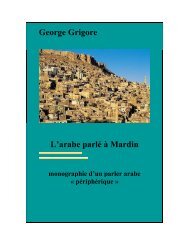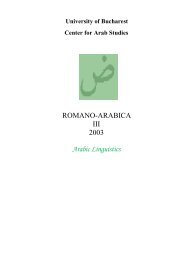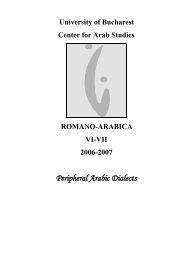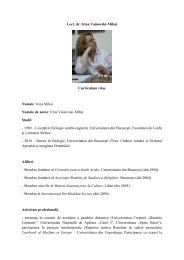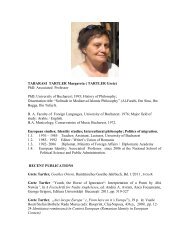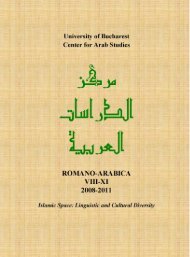12 55 Years of Arab Studies in Romania - Secţia de Arabă
12 55 Years of Arab Studies in Romania - Secţia de Arabă
12 55 Years of Arab Studies in Romania - Secţia de Arabă
You also want an ePaper? Increase the reach of your titles
YUMPU automatically turns print PDFs into web optimized ePapers that Google loves.
As seen above, mīš express<strong>in</strong>g the negation <strong>of</strong> the verb “to be” can prece<strong>de</strong><br />
many prepositions, with different mean<strong>in</strong>g, la- “for” or express<strong>in</strong>g possession,<br />
ma c “with”, bi- “<strong>in</strong>”.<br />
The particle mīš similar to the particle mā can sometimes add to the<br />
sentence an <strong>in</strong>terrogatory mean<strong>in</strong>g, as <strong>in</strong> the follow<strong>in</strong>g examples:<br />
Mira: mīš məberiḥ sa'alt-lī hāda s-su'al? wa 'awwal məberiḥ? wa 'awwal<br />
'awwal məberiḥ? „Didn’t you ask me the same th<strong>in</strong>g yesterday? And the day<br />
before yesterday? And the day before that?”<br />
Serge: mīš '<strong>in</strong>ti llī c āyše ma c a ahla bi-l-qaṭaṛ? „Aren’t you the one who<br />
lives with her parents <strong>in</strong> Qatar?”<br />
Inās: mīš 'ilti-l-nā <strong>in</strong>nu c am biyštiġil bi-'afri'iya? „Didn’t you tell us that<br />
he’s been work<strong>in</strong>g <strong>in</strong> Africa?”, <strong>in</strong> all the examples shown above mīš never<br />
actually expresses a negation, but actually has an <strong>in</strong>terrogatory mean<strong>in</strong>g.<br />
Although less <strong>of</strong>ten than the particle mā, mīš can also negate a verbal<br />
clause, usually when there is a present cont<strong>in</strong>uous verb, but not only:<br />
- With a present cont<strong>in</strong>uous verb:<br />
Serge: mīš c am ṣaddi' šū c am biṣēr ma c i. “I can’t believe what is<br />
happen<strong>in</strong>g to me.”<br />
Layla: b<strong>in</strong>t mitel l-'amaṛ c omṛa tnēn wa c išrīn sene bidda rijēl akbar m<strong>in</strong>na<br />
wa-mīš c am biy'bal?. „A very beautiful girl (lit. a girl like the moon), who is<br />
twenty two years wants a man that is ol<strong>de</strong>r than her and he doesn’t accept?”<br />
- With a verb that expresses a future action:<br />
Rola: mīš raḥ ridd ba'a c ā telefonēt. „I won’t answer the phone anymore.”<br />
We’d like to draw attention that this last mean<strong>in</strong>g <strong>of</strong> mīš, ren<strong>de</strong>r<strong>in</strong>g the<br />
negation <strong>in</strong> a verbal clause, is not mentioned <strong>in</strong> the consulted resources, most <strong>of</strong><br />
their authors po<strong>in</strong>t out that mīš is just a nom<strong>in</strong>al particle.<br />
2.1.4. Particle mū<br />
This particle, as we can see from the consulted works is not a particle<br />
characteristic <strong>of</strong> the Lebanese dialect, thus it only appeared <strong>in</strong> one l<strong>in</strong>e, <strong>in</strong> the<br />
analyzed episo<strong>de</strong>s <strong>of</strong> the Lebanese series 'ajyāl. We may only assume that the<br />
particle appeared un<strong>de</strong>r the <strong>in</strong>fluence <strong>of</strong> another dialect, that the actor or the<br />
screenwriter is familiar to.<br />
In our only example mū appeared as a nom<strong>in</strong>al particle:<br />
Theo: mū mumk<strong>in</strong> i'bal lā šī wu-lā ḥada yəsabib lī 'iḥbāṭ. “I can’t let<br />
anyone or anyth<strong>in</strong>g affect me.”<br />
29



